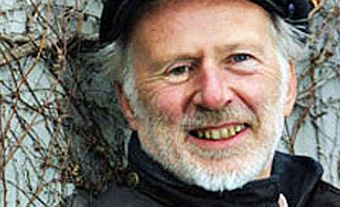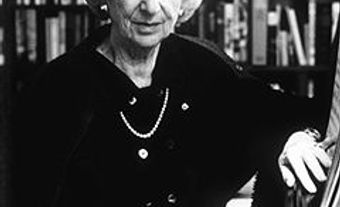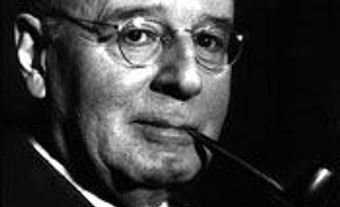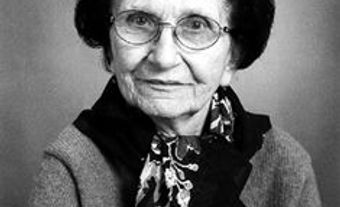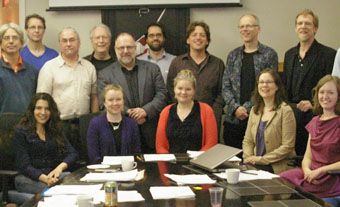Alexina Diane Louie, OC, OOnt, FRSC, composer, pianist, teacher (born 30 July 1949 in Vancouver, BC). Alexina Louie is one of Canada’s most celebrated composers. She writes music with an imaginative and spiritual blend of Asian and Western influences. Her compositions have earned many prizes, including multiple Juno and SOCAN Awards. Her most significant works include Scenes from a Jade Terrace (1988), Music for Heaven and Earth (1990) and Bringing the Tiger Down from the Mountain II (2004). Louie is the first woman to receive the Jules Léger Prize for New Chamber Music and served as composer-in-residence at the Canadian Opera Company from 1996 to 2002. An Officer of the Order of Canada and a Fellow of the Royal Society of Canada, she has received the Order of Ontario, the Molson Prize and a Governor General’s Performing Arts Award for Lifetime Artistic Achievement.
Early Years and Education
Louie began piano lessons at age seven with Jean Lyons. At the University of British Columbia, she studied music history and piano with Barbara Custance and Frances Marr Adaskin; as well as composition with Cortland Hultberg. She supported herself by playing piano at Vancouver's Devonshire and Georgia Hotels. She received a Regent's Fellowship from the University of California at San Diego, where she undertook graduate studies in composition with Robert Erickson and Pauline Oliveros (1970–74).
Louie was a member (1971–74) of the San Diego-based Women's Ensemble. The group performed meditations through exercises in sound and movement. This exploration of the less tangible aspects of music influenced her compositional approach. She also studied Asian music and the Chinese tradition under Tsun-Yuen Lui. (See also Chinese Music in Canada.)
Louie taught piano, theory and electronic music at Pasadena City College (1974–80) and at Los Angeles City College (1976–80). Most of her earlier compositions combine elements of Asian music with avant-garde techniques (e.g., her electronic work, Molly, aimed to make an electronic composition sound "human"). Lotus (1977), commissioned by Days Months and Years to Come (aka Magnetic Band), and Lotus II (1978) incorporate sounds and structural elements of Indonesian gamelan ensembles.
Compositions and Career, 1980–2000
Louie returned to Canada in 1980 and settled in Toronto. The focus of her career since then has been composing. She has also taught theory and composition occasionally at the Royal Conservatory of Music, York University and the University of Western Ontario. Following the CBC commission Refuge (1981) for accordionist Joseph Macerollo, and the Canada Council commission Incantation (1980) for Music Inter Alia, Louie was sought after for symphonic and chamber works, many of which have received numerous performances in Canada and abroad. In 1983, she became a founding director of Toronto’s Esprit Orchestra.
Other commissioned works of this period include Music for a Thousand Autumns (1983) for the Société de musique contemporaine du Québec; Concerto for Piano and Orchestra (1984) for the CBC, The Ringing Earth (1986) for the opening of Expo 86 in Vancouver; The Eternal Earth (1986) and Music for Heaven and Earth (1990) for the Toronto Symphony Orchestra (TSO); Star-filled Night (1987) for pianist Christina Petrowska Quilico; Scenes from a Jade Terrace (1988) for pianist Jon Kimura Parker; and Thunder Gate (1990) for the Montréal International Music Competition.
Her numerous commissions in the 1990s include Gallery Fanfares; Arias and Interludes (1992) for the Art Gallery of Ontario; and Shattered Night, Shivering Stars (1997) for the National Arts Centre and CBC. In 1999, she became the first woman to receive the Jules Léger Prize for New Chamber Music for Nightfall (1997).
Louie’s appointment as composer-in-residence (1996–2002) at the Canadian Opera Company resulted in the full-length opera The Scarlet Princess (libretto by David Henry Hwang). It was premiered in concert form in April 2002. Additional operas followed, including Burnt Toast (2002), a series of eight comedic mini-operas for television with librettos by Don Redican. The five-minute tragic opera Toothpaste (1995) was premiered in 2002 by the Esprit Orchestra.
Compositions in the 21st Century
Louie’s notable 21st-century compositions include String Quartet No. 2, premiered in 2003 at the Great Composers Festival in Ottawa, and Bringing the Tiger Down from the Mountain II, premiered in 2004 by the NAC Orchestra and taken on tour. The following year, the National Arts Centre Orchestra premiered her Infinite Sky With Birds. In 2007, the National Ballet of Canada’s production of her ballet score, Wolf's Court (choreography by Matjash Morzewski), became the first major Canadian composition performed at Toronto's Four Seasons Centre for the Performing Arts.
In 2009, Louie's Pursuit, a concerto for orchestra and string quartet, was premiered by the Toronto Symphony Orchestra and the Tokyo String Quartet. Her Take the Dog Sled, for throat-singers (see Inuit Vocal Games), was commissioned by the Montreal Symphony Orchestra for its 2008 tour of Nunavik. Imaginary Opera (2004) was commissioned by the Société de musique contemporaine du Québec and Radio France. The Raven (2009) was a joint commission from the Luminato Festival of the Arts and the Ottawa International Chamber Music Festival. Echoes of Time (based on Olivier Messiaen’s Quartet for the End of Time) was commissioned for the Gryphon Trio in 2011.
Film and Television Scores
With her husband, composer Alex Pauk, Louie has co-composed many scores for films and television productions. They include Don McKellar's Last Night (1998); Jeremy Podeswa's feature film The Five Senses (1999) and his TV movie After the Harvest (2001); Rhombus Media's docudrama Ravel's Brain (2001) and its feature film Perfect Pie (2002); as well as several National Film Board documentaries.
Louie and Pauk also scored the music for the film Pearls of the Far East (2011); the satirical musical The Opera (2011, libretto by Dan Redican); the documentary Inside Hana’s Suitcase (2009) and “The Beaver Whisperers” (2013), seen on CBC TV’s The Nature of Things with David Suzuki.
Composition Style
Louie’s compositions, such as The Eternal Earth and Music for Heaven and Earth, employ sounds that are atmospheric and evocative of the East, with bell and gong sounds often produced by a large percussion section. Typical of her work is Winter Music (1989), commissioned by the Vancouver New Music Society, a chamber concerto for viola and 11 instruments that employs Chinese percussion references. It is an emotional tour de force, by turns lyrical, colourful and virtuosic.
Composer John Rea once observed that Louie’s music is filled with longing. Her musical style acknowledges traditional structures such as those found in the music of her favourite composers (Bach, Mozart and Mahler), combined with a contemporary language that emphasizes expression and communication. O Magnum Mysterium for 44 divisi strings includes quotations (appropriations) of music by Bach and from Mahler's "Der Abschied" in a texture of Eastern-influenced sounds which is also, at times, reminiscent of electronic music. Jon Kimura Parker wrote in SoundNotes that "she reaches others through a unique and personal blend of well-established Eastern and Western practices."
Recognition and Honours
Louie has received three SOCAN Jan V. Matejcek Concert Music Awards as the country’s most frequently-performed composer. Her works have been performed by several Canadian orchestras including the Montreal Symphony Orchestra and the Hamilton Philharmonic, as well as by the San Francisco Symphony, the BBC Symphony, the St. Louis Symphony and many others. The Toronto Symphony Orchestra and Esprit Orchestra have also performed her compositions on tour. Pianist Jon Kimura Parker performed Scenes from a Jade Terrace to open the Canadian Embassy in Tokyo in 1991. In 2013, the NAC Orchestra performed Louie’s Bringing The Tiger Down From the Mountain II in Hong Kong.
Louie was a featured composer at the McGill University-Montreal Symphony Orchestra New Music Festival. From 2002 to 2007, Louie (with Denys Bouliane and Gary Kulesha) was a resident composer with the National Arts Centre Orchestra, with whom she toured BC and Western Canada. She has also been composer-in-residence for the Scotia, Vancouver, Boris Brott and Banff music festivals. In 2019, she was awarded the $50,000 Molson Prize by the Canada Council.
Awards
- Composer of the Year, Canadian Music Council (1986)
- Best Classical Composition (Songs of Paradise), Juno Awards (1989)
- Jan V. Matejcek Concert Music Award, SOCAN (1990, 1992, 2003)
- Chalmers Award (Gallery Fanfares), Chalmers Fund (1994)
- Honorary Doctorate, University of Calgary (1997)
- Jules Leger Prize for Composition (1999)
- Best Classical Composition (Shattered Night, Shivering Stars), Juno Awards (2000)
- Order of Ontario (2001)
- Louis Applebaum Composer Award (2002)
- Composers Award, National Arts Centre (2002)
- Queen Elizabeth II Golden Jubilee Medal, Government of Canada (2002)
- Officer, Order of Canada (2005)
- Fellow, Royal Society of Canada (2006)
- Queen Elizabeth II Diamond Jubilee Medal, Government of Canada (2012)
- Molson Prize, Canada Council for the Arts (2019)
- Lifetime Achievement Award (Classical Music), Governor General’s Performing Arts Awards (2021)

 Share on Facebook
Share on Facebook Share on X
Share on X Share by Email
Share by Email Share on Google Classroom
Share on Google Classroom

